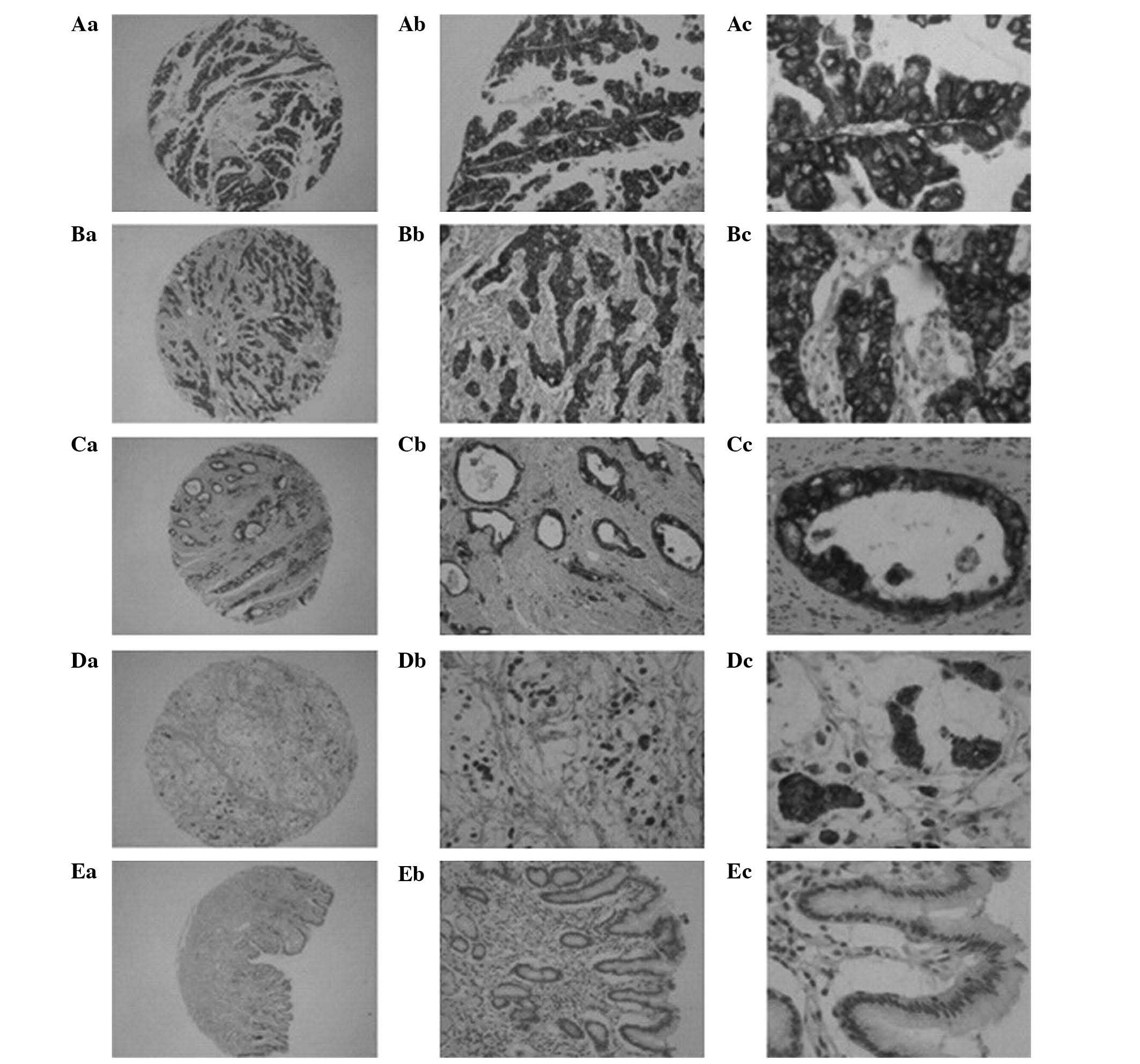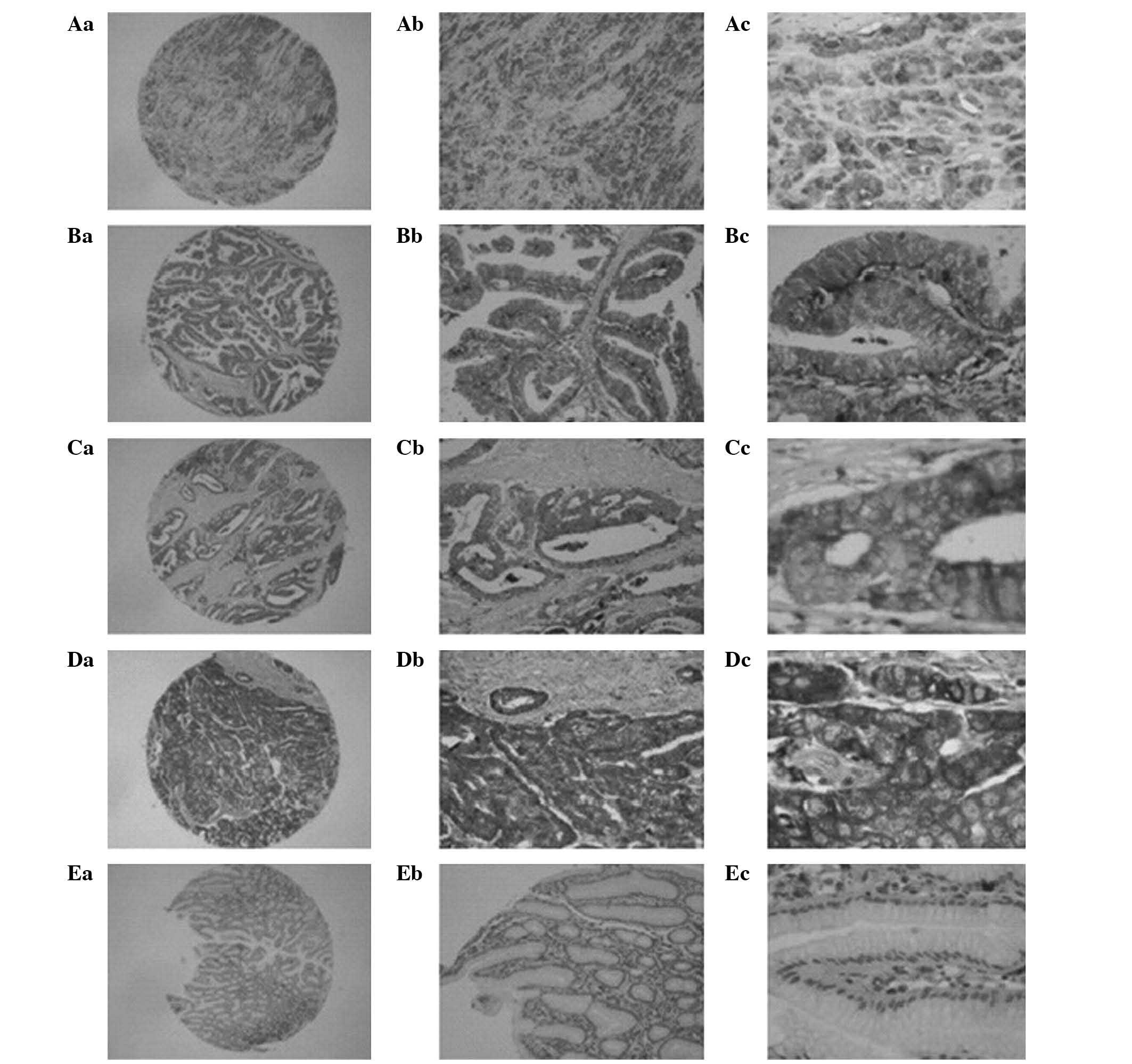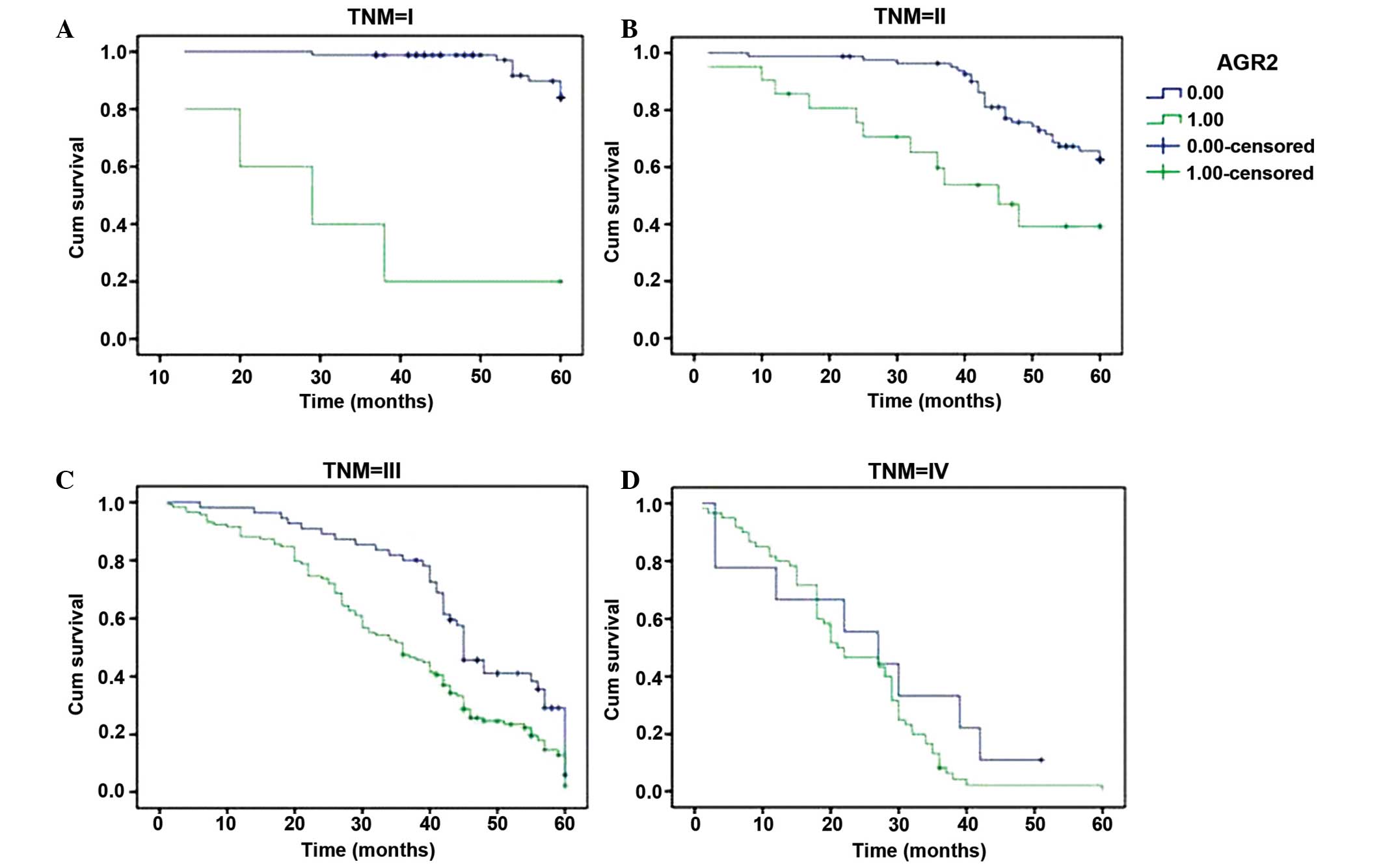|
1
|
Murray CJ and Lopez AD: Alternative
projections of mortality and disability by cause 1990–2020: Global
Burden of Disease Study. Lancet. 349:1498–1504. 1997. View Article : Google Scholar : PubMed/NCBI
|
|
2
|
Inoue M and Tsugane S: Epidemiology of
gastric cancer in Japan. Postgrad Med J. 81:419–424. 2005.
View Article : Google Scholar : PubMed/NCBI
|
|
3
|
Shanghai Municipal Center for Disease
Control and Prevention. Shanghai Cancer Report 2010 (Shanghai).
SCDC. 2010.
|
|
4
|
WH Z and FH H: Surgical therapy of gastric
cancer in china. J Pract Oncol. 23:91–93. 2008.
|
|
5
|
Bogenrieder T and Herlyn M: Axis of evil:
Molecular mechanisms of cancer metastasis. Oncogene. 22:6524–6536.
2003. View Article : Google Scholar : PubMed/NCBI
|
|
6
|
Barraclough DL, Platt-Higgins A, de Silva
Rudland S, Barraclough R, Winstanley J, West CR and Rudland PS: The
metastasis-associated anterior gradient 2 protein is correlated
with poor survival of breast cancer patients. Am J Pathol.
175:1848–1857. 2009. View Article : Google Scholar : PubMed/NCBI
|
|
7
|
Liu D, Rudland PS, Sibson DR,
Platt-Higgins A and Barraclough R: Human homologue of cement gland
protein, a novel metastasis inducer associated with breast
carcinomas. Cancer Res. 65:3796–3805. 2005. View Article : Google Scholar : PubMed/NCBI
|
|
8
|
Fritzsche FR, Dahl E, Dankof A, Burkhardt
M, Pahl S, Petersen I, Dietel M and Kristiansen G: Expression of
AGR2 in non small cell lung cancer. Histol Histopathol. 22:703–708.
2007.PubMed/NCBI
|
|
9
|
Park K, Chung YJ, So H, Kim K, Park J, Oh
M, Jo M, Choi K, Lee EJ, Choi YL, et al: AGR2, a mucinous ovarian
cancer marker, promotes cell proliferation and migration. Exp Mol
Med. 43:91–100. 2011. View Article : Google Scholar : PubMed/NCBI
|
|
10
|
Pohler E, Craig AL, Cotton J, Lawrie L,
Dillon JF, Ross P, Kernohan N and Hupp TR: The Barrett's antigen
anterior gradient-2 silences the p53 transcriptional response to
DNA damage. Mol Cell Proteomics. 3:534–547. 2004. View Article : Google Scholar : PubMed/NCBI
|
|
11
|
Zhang JS, Gong A, Cheville JC, Smith DI
and Young CY: AGR2, an androgen-inducible secretory protein
overexpressed in prostate cancer. Genes Chromosomes Cancer.
43:249–259. 2005. View Article : Google Scholar : PubMed/NCBI
|
|
12
|
Dumartin L, Whiteman HJ, Weeks ME,
Hariharan D, Dmitrovic B, Iacobuzio-Donahue CA, Brentnall TA,
Bronner MP, Feakins RM, Timms JF, et al: AGR2 is a novel surface
antigen that promotes the dissemination of pancreatic cancer cells
through regulation of cathepsins B and D. Cancer Res. 71:7091–7102.
2011. View Article : Google Scholar : PubMed/NCBI
|
|
13
|
Allgayer H, Babic R, Grützner KU, Beyer
BC, Tarabichi A, Schildberg Wilhelm F and Heiss MM: An
immunohistochemical assessment of cathepsin D in gastric carcinoma:
its impact on clinical prognosis. Cancer. 80:179–187. 1997.
View Article : Google Scholar : PubMed/NCBI
|
|
14
|
Del Manuel Casar J, Vizoso FJ, Abdel-Laa
O, Sanz L, Martín A, Corte Daniela M, Bongera M, Muñiz García JL
and Fueyo A: Prognostic value of cytosolyc cathepsin D content in
resectable gastric cancer. J Surg Oncol. 86:16–21. 2004. View Article : Google Scholar : PubMed/NCBI
|
|
15
|
Saku T, Sakai H, Tsuda N, Okabe H, Kato Y
and Yamamoto K: Cathepsins D and E in normal, metaplastic,
dysplastic and carcinomatous gastric tissue: An immunohistochemical
study. Gut. 31:1250–1255. 1990. View Article : Google Scholar : PubMed/NCBI
|
|
16
|
Bartenjev I, Rudolf Z, Stabuc B, Vrhovec
I, Perkovic T and Kansky A: Cathepsin D expression in early
cutaneous malignant melanoma. Int J Dermatol. 39:599–602. 2000.
View Article : Google Scholar : PubMed/NCBI
|
|
17
|
Lösch A, Schindl M, Kohlberger P, et al:
Cathepsin D in ovarian cancer: Prognostic value and correlation
with p53 expression and microvessel density. Gynecol Oncol.
92:545–552. 2004. View Article : Google Scholar : PubMed/NCBI
|
|
18
|
Kirana C, Shi H, Laing E, et al: Cathepsin
D expression in colorectal cancer: From proteomic discovery through
validation using western blotting, immunohistochemistry and tissue
microarrays. Int J Proteomics. 2012:2458192012. View Article : Google Scholar : PubMed/NCBI
|
|
19
|
Adenis A, Huet G, Zerimech F, Hecquet B,
Balduyck M and Peyrat JP: Cathepsin B, L and D activities in
colorectal carcinomas: Relationship with clinico-pathological
parameters. Cancer Lett. 96:267–275. 1995. View Article : Google Scholar : PubMed/NCBI
|
|
20
|
Szajda SD, Snarska J, Jankowska A,
Roszkowska-Jakimiec W, Puchalski Z and Zwierz K: Cathepsin D and
carcino-embryonic antigen in serum, urine and tissues of colon
adenocarcinoma patients. Hepatogastroenterology. 55:388–393.
2008.PubMed/NCBI
|
|
21
|
Berchem G, Glondu M, Gleizes M, Brouillet
JP, Vignon F, Garcia M and Liaudet-Coopman E: Cathepsin-D affects
multiple tumor progression steps in vivo: Proliferation,
angiogenesis and apoptosis. Oncogene. 21:5951–5955. 2002.
View Article : Google Scholar : PubMed/NCBI
|
|
22
|
Krepela E: Cysteine proteinases in tumor
cell growth and apoptosis. Neoplasma. 48:332–349. 2001.PubMed/NCBI
|
|
23
|
Zhao ZS, Wang YY, Chu YQ, Ye ZY and Tao
HQ: SPARC is associated with gastric cancer progression and poor
survival of patients. Clin Cancer Res. 16:260–268. 2010. View Article : Google Scholar : PubMed/NCBI
|
|
24
|
Shou ZX, Jin X and Zhao ZS: Upregulated
expression of ADAM17 is a prognostic marker for patients with
gastric cancer. Ann Surg. 256:1014–1022. 2012. View Article : Google Scholar : PubMed/NCBI
|
|
25
|
Lee HS, Lee HK, Kim HS, Yang HK and Kim
WH: Tumour suppressor gene expression correlates with gastric
cancer prognosis. J Pathol. 200:39–46. 2003. View Article : Google Scholar : PubMed/NCBI
|
|
26
|
Lee HS, Lee HK, Kim HS, Yang HK, Kim YI
and Kim WH: MUC1, MUC2, MUC5AC and MUC6 expressions in gastric
carcinomas: Their roles as prognostic indicators. Cancer.
92:1427–1434. 2001. View Article : Google Scholar : PubMed/NCBI
|
|
27
|
Zhang D, Salto-Tellez M, Putti TC, Do E
and Koay ES: Reliability of tissue microarrays in detecting protein
expression and gene amplification in breast cancer. Mod Pathol.
16:79–84. 2003. View Article : Google Scholar : PubMed/NCBI
|
|
28
|
Lee HS, Cho SB, Lee HE, Kim MA, Kim JH,
Park J, Kim JH, Yang HK, Lee BL and Kim WH: Protein expression
profiling and molecular classification of gastric cancer by the
tissue array method. Clin Cancer Res. 13:4154–4163. 2007.
View Article : Google Scholar : PubMed/NCBI
|
|
29
|
Kolev Y, Uetake H, Iida S, Ishikawa T,
Kawano T and Sugihara K: Prognostic significance of VEGF expression
in correlation with COX-2, microvessel density and
clinicopathological characteristics in human gastric carcinoma. Ann
Surg Oncol. 14:2738–2747. 2007. View Article : Google Scholar : PubMed/NCBI
|
|
30
|
Mizokami K, Kakeji Y, Oda S, Irie K,
Yonemura T, Konishi F and Maehara Y: Clinicopathologic significance
of hypoxia-inducible factor 1alpha overexpression in gastric
carcinomas. J Surg Oncol. 94:149–154. 2006. View Article : Google Scholar : PubMed/NCBI
|
|
31
|
Fritzsche FR, Dahl E, Pahl S, Burkhardt M,
Luo J, Mayordomo E, Gansukh T, Dankof A, Knuechel R, Denkert C, et
al: Prognostic relevance of AGR2 expression in breast cancer. Clin
Cancer Res. 12:1728–1734. 2006. View Article : Google Scholar : PubMed/NCBI
|
|
32
|
Zweitzig DR, Smirnov DA, Connelly MC,
Terstappen LW, O'Hara SM and Moran E: Physiological stress induces
the metastasis marker AGR2 in breast cancer cells. Mol Cell
Biochem. 306:255–260. 2007. View Article : Google Scholar : PubMed/NCBI
|
|
33
|
Zhang Y, Forootan SS, Liu D, Barraclough
R, Foster CS, Rudland PS and Ke Y: Increased expression of anterior
gradient-2 is significantly associated with poor survival of
prostate cancer patients. Prostate Cancer Prostatic Dis.
10:293–300. 2007. View Article : Google Scholar : PubMed/NCBI
|
|
34
|
Iacobuzio-Donahue CA, Ashfaq R, Maitra A,
Adsay NV, Shen-Ong GL, Berg K, Hollingsworth MA, Cameron JL, Yeo
CJ, Kern SE, et al: Highly expressed genes in pancreatic ductal
adenocarcinomas: A comprehensive characterization and comparison of
the transcription profiles obtained from three major technologies.
Cancer Res. 63:8614–8622. 2003.PubMed/NCBI
|
|
35
|
Missiaglia E, Blaveri E, Terris B, Wang
YH, Costello E, Neoptolemos JP, Crnogorac-Jurcevic T and Lemoine
NR: Analysis of gene expression in cancer cell lines identifies
candidate markers for pancreatic tumorigenesis and metastasis. Int
J Cancer. 112:100–112. 2004. View Article : Google Scholar : PubMed/NCBI
|
|
36
|
Bai Z, Ye Y, Liang B, Xu F, Zhang H, Zhang
Y, Peng J, Shen D, Cui Z, Zhang Z, et al: Proteomics-based
identification of a group of apoptosis-related proteins and
biomarkers in gastric cancer. Int J Oncol. 38:375–383.
2011.PubMed/NCBI
|
|
37
|
Valladares-Ayerbes M, Díaz-Prado S,
Reboredo M, Medina V, Iglesias-Díaz P, Lorenzo-Patiño MJ, Campelo
RG, Haz M, Santamarina I and Antón-Aparicio LM: Bioinformatics
approach to mRNA markers discovery for detection of circulating
tumor cells in patients with gastrointestinal cancer. Cancer Detect
Prev. 32:236–250. 2008. View Article : Google Scholar : PubMed/NCBI
|
|
38
|
Smirnov DA, Zweitzig DR, Foulk BW, Miller
MC, Doyle GV, Pienta KJ, Meropol NJ, Weiner LM, Cohen SJ, Moreno
JG, et al: Global gene expression profiling of circulating tumor
cells. Cancer Res. 65:4993–4997. 2005. View Article : Google Scholar : PubMed/NCBI
|
|
39
|
Shiraishi N, Sato K, Yasuda K, Inomata M
and Kitano S: Multivariate prognostic study on large gastric
cancer. J Surg Oncol. 96:14–18. 2007. View Article : Google Scholar : PubMed/NCBI
|
|
40
|
Persson S, Rosenquist M, Knoblach B,
Khosravi-Far R, Sommarin M and Michalak M: Diversity of the protein
disulfide isomerase family: Identification of breast tumor induced
Hag2 and Hag3 as novel members of the protein family. Mol
Phylogenet Evol. 36:734–740. 2005. View Article : Google Scholar : PubMed/NCBI
|
|
41
|
Jordan PA and Gibbins JM: Extracellular
disulfide exchange and the regulation of cellular function.
Antioxid Redox Signal. 8:312–324. 2006. View Article : Google Scholar : PubMed/NCBI
|
|
42
|
Turano C, Coppari S, Altieri F and Ferraro
A: Proteins of the PDI family: Unpredicted non-ER locations and
functions. J Cell Physiol. 193:154–163. 2002. View Article : Google Scholar : PubMed/NCBI
|
|
43
|
Couët J, de Bernard S, Loosfelt H, Saunier
B, Milgrom E and Misrahi M: Cell surface protein
disulfide-isomerase is involved in the shedding of human
thyrotropin receptor ectodomain. Biochemistry. 35:14800–14805.
1996. View Article : Google Scholar : PubMed/NCBI
|
|
44
|
Lahav J, Gofer-Dadosh N, Luboshitz J, Hess
O and Shaklai M: Protein disulfide isomerase mediates
integrin-dependent adhesion. FEBS Lett. 475:89–92. 2000. View Article : Google Scholar : PubMed/NCBI
|
|
45
|
Willems SH, Tape CJ, Stanley PL, et al:
Thiol isomerases negatively regulate the cellular shedding activity
of ADAM17. Biochem J. 428:439–450. 2010. View Article : Google Scholar : PubMed/NCBI
|
|
46
|
Park SW, Zhen G, Verhaeghe C, Nakagami Y,
Nguyenvu LT, Barczak AJ, Killeen N and Erle DJ: The protein
disulfide isomerase AGR2 is essential for production of intestinal
mucus. Proc Natl Acad Sci USA. 106:6950–6955. 2009. View Article : Google Scholar : PubMed/NCBI
|
|
47
|
von Wasielewski R, Mengel M, Wiese B,
Rüdiger T, Müller-Hermelink HK and Kreipe H: Tissue array
technology for testing interlaboratory and interobserver
reproducibility of immunohistochemical estrogen receptor analysis
in a large multicenter trial. Am J Clin Pathol. 118:675–682. 2002.
View Article : Google Scholar : PubMed/NCBI
|

















